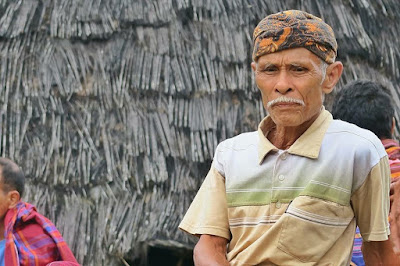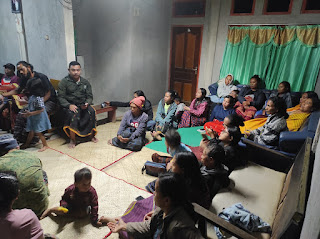Rice Harvest during a Pandemic
Go Beyond Borders
During the pandemic, all 8
regencies in Flores established blockades in their borders to prevent from the
spread of the Coronavirus, only those who can show their travel documents
issued by their Head of the regency and Health certificate who can pass the
border.
As for me who have stopped working
in tourism since February, to stay at home is no longer safe for survival, I
had to work outside to support the family especially working which is enough
for foods.
Wakos, the village where I grew up was chosen to be my escape. Knowing that East Manggarai Regency where Wakos is located still in the green zone making me feel alright to spend my time for main reason to harvest rice with relatives. Like some other people saying that it is not a matter of how to improve your life but how to survive in this difficult times. So, for me rice is main thing to possess so that I and the family still survive during pandemic.
Wakos is a village situated in
the valley about 900 meters above sea levels. To get there from Ruteng where I
live takes about 2 and half hours drive on the bus and continued on foot for 45
minutes as there is still no road accessed to the village. If you go on
motorbike, it takes you about 2 hours to arrive in Wakos.
Almost 100 percent people in
Wakos rely much on farming for living. Their surrounding is viewed with
beautiful rice terraces, coffee trees, cloves, and much more. Their main food
like most Indonesians is rice coupled with their famous black coffee that traditionally
processed by mortar and pestle.
“Leles Culture”
During my stay for a week in
Wakos, I lived in one of my relatives' houses owned by Bapa Riska. That house
has always been my choice when went to Wakos, it was simply chosen because I feel like
home. He and his wife welcomed everyone who came to their home very warmly. I
just felt most
loved, appreciated and understood by his family.
Me and Bapa Riska’s family shared a lot about
lives and how strong the relationship between the relatives has been built. We
occasionally talked about families’ plans for the future as we are going to fix
the cemetery of our grandparents. There’s a moment when Bapa Riska joked his
wife if he is going to leave her because of interrupting the talks. We did not
realize we had enjoyed cups of coffee and steaming cassava made by Mama Riska
(Riska is for their first child, it is a most respectful way to call people who
are elderly and have children).
By the first night after dinner, As Bapa Riska
knew that I was coming to work for his rice field, he informed me about the
harvest situation in Wakos especially between our relatives that the works
would be in form of "Leles" and he did not hire anyone for working on his land.
For me, when the family gave 20 kilograms meant everything.
‘’Leles” or “Dodo” in Manggarai is a mode of work where you work together with other people or relatives within a community or village without paying. This community work usually appears not just when you work on the fields but also when someone wants to marry, people will help you by submitting rice, money, animals so that you can give dowries to wife’s family. “Leles” is also practiced when someone wants to go to study, the other people of the community will contribute by submitting money so that the family can afford the education and this is done continuously rotating.
This mode of work apparently lost
in the big cities just like Ruteng where I live, you need to pay people who
work for you. It also takes time especially for working on the field.
Working on the paddy fields absolutely seem to be hard when you do it alone but this never happens in the village like Wakos. When planting or harvesting rice, people work together happily with big enthusiasm. They share stories while working, making jokes, children can play together on the field, dogs and chickens are totally free, and they shared foods together. They live very simple but very harmonious.
How people in Wakos think about Coronavirus?
By the time I was there, I joined
three different paddy fields belong to my relatives in three consecutive days to
harvest rice. I brought with me 3 kg of dried fish with only 30-40 pieces of
fish for each kilogram to eat for lunch.
I was just surprised by the number of people who went to work for harvesting, there were about 50 people but not including children who were about 10 of them. Normally it takes 1 or 2 days to finish the harvest but with such a number, the harvest finished before 12 pm. It was unbelievable! The fish I brought had to be cut off into 2 parts so that we all got the fish.
The second harvest day, I went to work on the paddy field belongs to Bapa Riska. I had prepared more fish to his family than the other two as a sign of my gratitude. The field is quiet far from the village that it needs about 2 hours walk down to the valley crossing the river to be able to reach the field.
As predicted, the number of
people were almost the same as previous day, more than fifty but not including
children and their pets. Even though it is far away from home and they worked under
the sun but it did not lose their smiles and jokes. Due to big paddy field, it
took about 3 hours to get the job done before 1 pm. The lunch was also quite
the same, a plate full of rice, cooked squash and cassava leaves, added with
half fried fish and piece of chicken that Bapa Riska already prepared.
While having lunch, the farmers
shared a lot about their harvest and their daily activities which was full of
humors but surprisingly none of them mentioned about the Coronavirus. I
questioned myself if these people knew or not about this virus and whether they
are afraid or not with the virus.
The talks became serious when I
asked their knowledge about corona. For Mama Nita Corona is not something to be
afraid of. She said: “we are normally afraid of devil or bad spirit because we
can imagine how it looks like, but how on earth we are afraid of invisible
thing? Or maybe it is like devil that makes people afraid?’’ she ended her talk.
“We must not be afraid of Corona
otherwise how we are able to survive if we don’t work”, Bapa Delis said to his
friends. He added “we are happy that we can still eat rice from our farm
but unlike some people who are getting very hard to survive during this time,
so we must be proud of ourselves to be able to survive” he convinced his
friends.
I was once shocked when it came to the grandma whose age is about 70. She said if she was so happy with Mr. Corona who has helped her for the first time in her life as she imagined Corona is very kind human being. She hoped that the situation will last longer so that she will be always helped financially by the government every month because she had never experienced this before. People who heard this could just laugh at her.
 Due to the location of the rice
field is closer to the river, me and the children went to swim in the river
which is about 2 meters deep. It was just unbelievably fresh, the water is so
cold coming from the mountain surrounded by huge cliff on the other side.
Due to the location of the rice
field is closer to the river, me and the children went to swim in the river
which is about 2 meters deep. It was just unbelievably fresh, the water is so
cold coming from the mountain surrounded by huge cliff on the other side.
Hendra, 10 years old,
decided to climb a rock about 8 meters to jump into a river that is like a
swimming pool made of stone and sand under the water. Hendra is known by his
friends as very wicked boy. It happened once he pushed me over as I was too
afraid to swim in deeper zone. It was shocking experience but at the same time
I thanked him for making it into reality, I finally did it.

As per third harvest day, the
location of the paddy field was even much further than Bapa Riska’s field. We
had to walk about 3 hours to reach the field through 1 village Riwu, rice
fields, cliffs, and river. This clearly affected to the number of people who
went to work that were only about forty and quiet reasonable because in one day
they had two same works that caused people were divided.
On our way to the rice field, I
was given the options to walk by the steeper or sloping road. I chose to walk
through the steeper road because it is shorter than another one. It was not
disappointing choice at all once I was surprised by the landscape. Rice fields
set through the hills, lined mountains, neatly arranged villages, rivers with
the sound of fast flowing water coupled with the singing of birds behind trees
that still stand firm. From the hill where I stood, I heard children singing
through their shelter who guarding their rice fields from monkeys.
Ari, one of my nephews who walked
with me said if those children were sleeping in their shelter for couple of
days before the rice is cut off, they had to be ready much earlier in the
morning to protect their rice from animals like birds, monkey, insects, and wild
pig.
I was happy because I could still
turn my phone on for taking picture as it hasn't been charged for 2 days. In
Wakos there are only 2 families out of 130 families that have electricity and
television.
Just 5 minutes before arriving at
the shelter, I and my nephews looked for woods in the garden used for cooking
and another one taking water from the spring to cook for making coffee while we
were in the rice field.
As we arrived earlier at the
shelter, the owner of the rice field did an offering ritual by scarifying
a chicken added with 1 bottle of arak. This was made in order that the spirits
give plenty of harvest, the workers are away from sick or accident while
harvesting, and new rice that will be consumed will give healthy and
prosperity.
Due to the rice field is not that
large, we harvested about 500 kilogram of rice and it only took us about 1 and
half hours to get the job done. The rest of the time before lunch, I and my
nephews were going to look for toads to eat for lunch. We were lucky because
the rice field is located just by the spring where most of the big toads are surviving. We got 8 big toads and they were good enough for adding with
the fish I had prepared.
For people in Wakos,
they must be very grateful and respectful to their land for giving them enough
food. This is perhaps the most sought for people nowadays.








Komentar